
Reg.
Trib. Milano n. 418 del 02.07.2007
Direttore responsabile: Elisabetta Brunella
|
 |
International Edition No. 89
year 7 - 24 December 2012 |
 |
|
Dear readers,
 it is a pleasure to open this issue of the DGT Online Informer by extending our best wishes for the festive period and a happy 2013. it is a pleasure to open this issue of the DGT Online Informer by extending our best wishes for the festive period and a happy 2013.
For MEDIA Salles 2013 will once again be an important year rich in projects and new initiatives.
As already announced in our last issue, DigiTraining Plus will be moving eastwards to Poland from 28 August to 1 September with a brand new subtitle: "New Technologies for the European Cinemas of the Future", accompanied by an innovative approach.
The course, which since 2004 - when there were only 30 digital screens in Europe - has been accompanying Europe's professional players in the transition to the new technologies, has adapted on each new occasion to the issues connected with digitalization.
In 2013, on the one hand we shall be taking a look at the 40% of European screens that are not yet digitalized, to identify the economic models capable of allowing the conversion of all screens. The objective is to avoid the introduction of the new technology resulting in closure for those cinemas where their socio-cultural vocation plays a major role.
As for digital theatres, we shall be looking to the future, to see how the new technologies are changing cinema management and what advantages they provide in terms of offer.
The 2013 course will thus be taking up where the 2012 edition concluded, when Thomas Hoegh, founder of Arts Alliance, sketched out new scenarios for the cinemas of the future, in which digital is put to the service of quality to maintain the key role of the cinema-space.
Once again
Best Wishes,
Luigi Grispello,
President of MEDIA Salles
(Per leggere il testo in italiano cliccare qui) |
 |

Save the date!
The tenth edition of
DigiTraining Plus
New Technologies for the European Cinemas of the Future
will take place
in Poland
from 28 August to 1 September 2013
Follow the updates
at the page dedicated to the course:
http://www.mediasalles.it/training/training.htm
|
|
|
From the MEDIA Programme to Creative Europe
On 18 December the Culture Committee of the European Parliament awarded the report on "Creative Europe" drafted by MEP Silvia Costa.
On the European Day organized by the MEDIA Desk at the Rome Festival, the MEP Silvia Costa commented on the European Commission's new Programme, "which - she stressed - is to be appreciated in particular for opting to create a programme for the whole of the cultural and creative sector, including the audiovisual, in consideration of the challenges shared by all its constituent parts:fragmentation, globalization and thus competition, digitalization, the difficulty of accessing credit - especially for small and medium-sized businesses - and the lack of comparative data.
Costa also mentioned the difficulties of the cinema exhibition sector, emphasizing the problem of digitalizing cinemas, with particular regard to those situated in small places and to the quality and art-house sector: "We must complete the process within a year to avoid closure by around 15% of Italian and European cinemas."
The MEP urged Italy to reinforce action in the field of digitization. She pointed out that "Creative Europe" alone will not be sufficient to complete the process, but that all the tools made available by the European Union, including the Structural Funds, should be made use of, coordinating as well the initiatives taken by the Regions.
(Click here to read the whole article on the European Day)
(Per leggere il testo in italiano cliccare qui)
|
Slow progress: Latin America's digital rollout varies dramatically by country
by Roque González
A number of countries now report that their screens are 100% digital (e.g., Norway and the Netherlands), and in some major markets that percentage is up to near 80% (for example, the U.S., U.K., France and Japan). Nevertheless, in Latin America the numbers for the digital rollout are poor and the speed of the process is slow: Penetration is currently at 33% (23% if we don't include the three countries with the highest rate of screen digitization - Mexico, Colombia, and Ecuador). One year ago, the percentage in Latin America was 22% (20% excluding Mexico and Colombia).
Many factors can help explain this situation: small markets (with no commercial venues attractive to the multinational companies, except in the Mexican and Brazilian markets); no significant presence in the region of virtual print fees, and the lack of development policies (except in Brazil).
In fact, foreign exhibitors with operations in Latin America are privately negotiating VPFs for their own theatres with the majors. But national exhibitors (big and small) haven't reached any agreements; only the very big circuits, like Cinépolis, Cinemex and Cine Colombia, have power enough to negotiate with the majors.
(Click here to read the whole article)
(Per leggere il testo in italiano cliccare qui)
|
|
|
2012: LARGE AND SMALL, 100% DIGITAL
by Camilla Lomazzi Jørgensen and Francesca Mesiano
The full conversion to digital by European circuits has been continuing in 2012. If this process is relatively easy for the large chains, which generally avail themselves of VPF models by means of an intermediary, independent and arthouse cinemas, which rarely have economic resources of their own to deal with the transition, use a wider variety of models, often based on public intervention.
As regards the large chains with an international horizon, a full conversion to digital took place in 2012 in Pathé Suisse, which by June 2012 had 10 digitalized cinemas for a total of 70 screens, of which 44 are fitted with 3D technology and 3 with a 4K projector.Similarly, in the Netherlands Pathé boasted 21 digital cinemas for a total of 159 auditoriums. There are 108 3D screens, of which 3 IMAX, whilst 17 are fitted with 4K projectors.
Amongst players active on a single market, Kinopolis in Germany offers 16 fully digitalized cinemas, for a total of 130 screens, of which 75 are 3D.
Commercially oriented chains are not the only ones to go 100% digital: an interesting example in the art-house sector is represented by Curzon Cinemas in the U.K., a company that has made "art-house" cinema its strong point and which has fully digitalized its 6 London cinemas for a total of 12 screens, also equipped for 3D. And on the subject of single-screen art-house cinemas in the provinces, an interesting example comes from the French movie theatre QUAI56 in Guer, with a seating capacity of 184, which has equipped itself with digital and 3D technology.
In Italy the Cinelandia group, owner of 10 complexes in the North of Italy, has chosen to use its own resources for digitalization, completing the conversion of its cinemas in Gallarate (8 screens) and Aosta (5 screens) with the installation of Christie and Barco projectors at the end of November.
The chain's remaining 7 analogical screens - situated in the cinemas of Cantù 2000 and the centre of Cuneo - will be digitalized in 2013. As Cinelandia has opted for direct purchase, the VPF fee will be paid by distributors directly to the company itself.
No VPF agreement, instead, for Century Cinemas of Letterkenny (IRL), which completed the digital conversion of its 8 cinemas with Kinoton projectors during 2012. Mark Doherty, owner of Century Cinemas, is very satisfied with the quality achieved by digital and is a strong believer in the future of "cinema at the cinema". "The movie theatre", he states, "will always be a communal place . But the quality of the experience must be the best we can offer. When they go out in the evening, I want people to come right here."
|
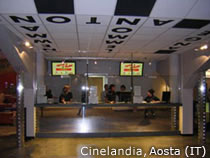 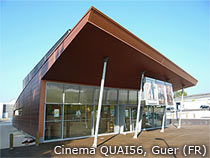 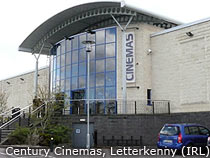
(Per leggere il testo in italiano cliccare qui) |
|
WOMEN IN DIGITAL CINEMA
Sophie De Vinck
Senior researcher
iMinds-SMIT, Vrije Universiteit Brussel
 As a researcher, I have found it fascinating to try and piece together the complex ins and outs of a sector where "nobody knows anything", as William Goldman once said about the film industry. After my studies (Communication Studies and an additional year in European Politics), I joined the VUB research centre SMIT (which is part of iMinds) to begin a PhD on the European audiovisual industries in the digital age. Starting out with a rather broad interest in how digital evolutions were affecting the cultural industries in Europe, I became fascinated with how these developments were shaping the future of the film sector. Even before the completion of my PhD in 2011, I became particularly interested in the challenges posed by the digital cinema transition. It is clear that this is about much more than resolution or other equipment characteristics: it is about rediscovering the magic of the cinema experience in a digital context. As a researcher, I have found it fascinating to try and piece together the complex ins and outs of a sector where "nobody knows anything", as William Goldman once said about the film industry. After my studies (Communication Studies and an additional year in European Politics), I joined the VUB research centre SMIT (which is part of iMinds) to begin a PhD on the European audiovisual industries in the digital age. Starting out with a rather broad interest in how digital evolutions were affecting the cultural industries in Europe, I became fascinated with how these developments were shaping the future of the film sector. Even before the completion of my PhD in 2011, I became particularly interested in the challenges posed by the digital cinema transition. It is clear that this is about much more than resolution or other equipment characteristics: it is about rediscovering the magic of the cinema experience in a digital context. 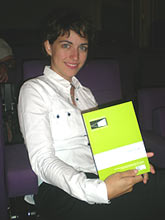 Here, cinema owners can use a variety of old and new tools to make their venue stand out amongst the many different leisure and culture options available. The digital future is not one of cookie-cutter solutions, but I am convinced that the additional workload that comes with it will be very rewarding, every time the right match is found between the theatre venue, the content (not necessarily only films) and the overall experience offered to the audience. Here, cinema owners can use a variety of old and new tools to make their venue stand out amongst the many different leisure and culture options available. The digital future is not one of cookie-cutter solutions, but I am convinced that the additional workload that comes with it will be very rewarding, every time the right match is found between the theatre venue, the content (not necessarily only films) and the overall experience offered to the audience.
I see the installation of digital equipment in theatres as a first step in this process, and it is important to enable as many theatres as possible to take the hurdle. Ideally, this happens in a collaborative process, involving the different sector players as well as other stakeholders and policymakers. Luckily, this was the case in Belgium, where I have been actively involved in several policy initiatives to render the digital transition possible, even for smaller arthouse or neighbourhood cinemas. As such, I led the tendering process and integrator negotiations of the "Digital Cinema in Flanders" (DICIF) and the "Cinéma Numérique Wallonie-Bruxelles" (CNWB) initiatives. Both united cinemas under a common banner, centring on the idea of a buying-group VPF solution. As a researcher, it was very rewarding to be able to put my research experience to a more practical use and to collaborate intensively with different cinema owners, policy departments and other stakeholders, such as the Flemish institute for the audiovisual and cinema, visual, and media arts BAM Art.
The end of the year may bring the completion of the digital cinema roll-out in Belgium, but the journey continues, and I look forward to being a part of it.
(Per leggere il testo in italiano cliccare qui)
|
All different, all digital
by Elisabetta Brunella
This column hosts portraits of cinemas in Europe and the rest of the world which are quite different from one another but have in common the fact that they have all adopted digital projection.
CineLounge, Houten (NL)
Country |
Site |
Town |
Company |
Number of digital
projectors |
Projector
|
Resolution |
|
No. of 3D screens |
Supplier of 3D technology |
The Netherlands |
CineLounge |
Houten |
Roma Service Bioscopen |
4 |
Christie
|
2k |
Dolby |
3 |
Dolby |
Whether or not it's the latest one I don't know. To be sure it is the most innovative Dutch cinema. Starting from the fact that it was the first complex in the Netherlands to come into being equipped with digital technology only. Opened on 26 February 2010, the CineLounge in 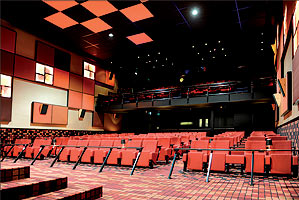 Houten - a town of 48,000 inhabitants, quickly expanding to the point of touching on the borders of the larger and more famous Utrecht - has never set eyes on a 35mm film reel. Houten - a town of 48,000 inhabitants, quickly expanding to the point of touching on the borders of the larger and more famous Utrecht - has never set eyes on a 35mm film reel.
"To be precise," explains the manager, Annemieke McCabe, who combines a calm and courteous manner with extreme attention to the various aspects of a cinema that is small but complex to manage, "the only thing we still saw of 35mm film was the cans: at the beginning distributors were not yet equipped with packaging suited to the digital age. We would open the big lid of the can and inside we'd find the little box containing the hard disk."
Now things have changed to the extent that material distribution is giving way to cable transmission.
"It was a gamble opening a cinema without passing through the 35mm phase. Yet our choice was right and met with cooperation from distributors: we never had to give up screening a film we had decided to show."
Just as it won the challenge of the "pure" digital, the CineLounge also won that of breathing new life into the "service bioscoop".
In the Netherlands, especially in smaller places, there used to be the tradition of small cinemas with a bar in the auditorium, where waiters managed to make themselves (almost) invisible as they served the spectators food and drink during the screenings.
Han Wolf, owner of the Roma Service Cinemas, who, we might say, inherits his talents, because he comes from a family which managed "services bioscoop", has conceived of a new version of these cinemas, supported by the most innovative technology and refined aesthetics, with 4 cinemas in the Netherlands. The CineLounge is the latest to be launched.
Here, in the four auditoriums, each distinguished by its own colour - sea green, lilac, red, brown -in various shades, the traditional concept of stalls and galleries re-appears. Whilst on the ground floor a wooden ledge in front of the seats, complete with a soft night-light, allows spectators to rest plates and glasses on it, in the gallery there are pairs of seats fitted with a table. In both cases the spectator can call a waiter by pressing a button and the latter will pass on their orders electronically to those who prepare the food.
 To call them "chefs", would be excessive: at the CineLounge it is not conceivable to have a meal in the same way as at a restaurant. But we are a long way from the classical popcorn. To call them "chefs", would be excessive: at the CineLounge it is not conceivable to have a meal in the same way as at a restaurant. But we are a long way from the classical popcorn.
In the space of ten minutes or so from calling, customers will find themselves being served sausages and fried potatoes or mixed tapas or even mini prawn cocktails.
They can combine this with a wide choice of drinks which, as well as the unfailing national beer - in this case Dommelsch, typical of the southern Netherlands - includes French and South African wines but also cocktails and strong liquor, from whisky to the pure Dutch Jeniever.
Those who do not wish to overdo the alcohol - or have perhaps already eaten at home - can opt for a slice of cake with tea or coffee, or an ice-cream of the "Australian" brand, invented, by the way, by a Belgian businessman.
An offer of this type has not been conceived for an audience of teenagers or young people but for a more adult clientèle, looking for a special evening out with an atmosphere completely different to that of the multiplexes.
These customers are also ready to book well ahead.
"The gallery," says Annemieke, "is extremely popular. 80% of the tickets we sell are booked in advance, with reserved seating."
What is more, anyone who opts for the gallery's "luxury seats" (100 out of 527), costing an extra 4 euros, has the privilege of being able to use the "Club Lounge", an exclusive space situated in the foyer, which also offers the opportunity of enjoying food and drinks.
The programming, based on current successes, and its refined style have made the CineLounge a venue that is appreciated not only by the inhabitants of Houten - this is its only cinema - but also by the decidedly larger and better served Utrecht.
"At the start, we had almost 100% local customers but after we had been open for a little over a year this percentage had already dropped to 75%. The fact that many spectators are willing to come some distance to be here does us great honour."
(Per leggere il testo in italiano cliccare qui) |
|
News on digitalisation worldwide
By Francesca Mesiano
New call for applications from MEDIA for the digitalization of Europe's cinemas
Since 2011 the European Commission's MEDIA Programme has beensupporting the digitalization of cinemas, with a constant view to promoting the circulation of European films.
This objective clearly results from the programming criteria established, which require at least 50% of European films.
The funds devolved for this scheme continue to grow.
The first call for applications, dated 2011, financed 57 cinemas for a total 2.5 million euros, or 500,000 euros more than initially forecast. The 14/2012 call, which closed in July 2012, also with an estimated budget of 2 million euros, actually allocated 3.12 million for the digitalization of 70 cinemas.
Based on these results, the new call, for which the deadline is 31 January 2013, has an estimated budget of 4 million euros.
The support mechanism is the same as for previous calls: up to 20,000 euros are granted per screen, destined to co-finance the indirect costs of digitalization, which do not, therefore, include expenditure for the projector and server.
The results of the support scheme for digitalization promoted by the MEDIA Programme are available on the European Commission's website:
http://ec.europa.eu/culture/media/fundings/exhibition/digitisation-of-cinemas/results_en.htm
(Per leggere il testo in italiano cliccare qui) |
Italy
Support from the Regions for Digitalisation*
Sicily
On 30 November the Call for Projects and Regulation of Intervention for the technological updating of Sicily's small and medium-sized cinema exhibitors* was published. The measure, which had already been announced last Spring (see DGT Online Informer no. 82), has finally been implemented and makes available 3 million euros for the digitalization of movie theatres in Sicily. It takes its place in the broader plan for the development of the Region's audiovidual industry constituted by the II Supplementary Act, Contemporary Senses - The development of the audiovisual industry in Southern Italy*.
The call and its attachments are published on the institutional website of the Department for Tourism, Sport and Entertainment:
http://pti.regione.sicilia.it/portal/page/portal/PIR_PORTALE/PIR_LaStrutturaRegionale/..
Lombardy
Lombardy confirms its position as one of the most active Regions in terms of support for the digitalization of cinemas, to which 4 different calls for applications have been devoted.In the first 3 calls (with an investment of 5 million euros) 80 theatres were digitalized, whilst the fourth has just closed with an allocation of 1.5 million.
The Region of Lombardy has very recently signed an agreement with Banca Intesa and its subsidiary, Banca Prossima, to activate a revolving fund of 10 million euros.
The financing may be provided in different forms, from the anticipation of public contributions to the granting of credit as "cover for temporary cash requirements", right up to investments for the installation of digital equipment.
Applications must be presented directly at Banca Intesa's branches and decisions regarding the financing are at the Bank's discretion, whilst the Region will carry out checks and monitor the progress of the applications every three months.
* This article updates the articles published in DGT online informer nos. 88, 82.
(Per leggere il testo in italiano cliccare qui
|
France
Travelling cinemas also receive support for digitalization
Travelling cinemas in France can approach the world of digital, thanks to support from the Centre National du Cinéma et de l'Image Animée (CNC), which has for some time been committed to giving support for digitalization to commercially "weaker" cinemas.
Support is now also available for the 125 travelling cinemas passing through around 2,000 municipalities throughout the country.
The extension of economic support follows the market launch of projectors suited to "travelling" cinemas.
Available for consultation on the ANCI (National Association of Travelling Cinemas) website (www.cinema-itinerant.org) are the results of the comparative tests run on Christie, Barco and NEC models.
(Per leggere il testo in italiano cliccare qui)
|
Spain
Cines ABC signs an agreement with Arts Alliance Media
The Cines ABC chain, owner of 6 cinemas in the Valencia region, has signed an agreement with Arts Alliance Media for the installation of digital projectors in 5 sites, on a total of 55 screens.
The agreement comes under the AAM/Barco Leasing Programme, which foresees costs being financed by Arts Alliance Media and Barco and recovered by means of a VPF.
This formula - pointed out the CEO of Cines ABC, Emilio Pechuán - will make it possible to contain the exhibitor's initial investment outlay.
As well as the digital projector, on each of the Cines ABC screens an IMB (Integrated Media Block), the Theatre Management System Screenwriter and Doremi's server ShowVault will be installed, thus allowing the cinemas to screen high frame rates content.
Kelonik, the integrator partnering Arts Alliance Media in Spain, will monitor the installation process.
(Per leggere il testo in italiano cliccare qui)
|
VSI Group and dcinex
VSI Group, a London-based company that for over twenty years now has been offering subtitling and dubbing services, and dcinex have announced a business partnership whose objective is to offer distributors a "one-stop-shop" of digital contents.
As a first step a new centre of DCP content distribution has been opened in Paris, as a support to the satellite distribution platform DSAT (recently created from the collaboration between dcinex and Eutelsat - see DGT online informer no. 88).
(Per leggere il testo in italiano cliccare qui)
Barco and NEC: the projectors for small cinemas
Now that the switch-off for 35mm is drawing closer, it has become essential to offer tools to those cinemas that have not yet converted to the new technologies.
In relation to this there are interesting offers of new projectors specially designed for small, independent and art-house cinemas.
Barco's DP2K-10Sx was recently launched on the market - a compact digital projector with integrated Media Server, compatible with all 3D systems and with the option of adaptation for high-frame-rates projection.
The model Nec NC900C has also just obtained DCI certification. This, too, is a compact and relatively lightweight model, designed for use in small cinemas but also in auditoriums, university lecture rooms, art galleries and open-air cinemas.
The Nec NC900C and a version without integrated Media Server of the Barco DP2K-10S, are amongst the digital projectors undergoing comparative analysis in France by the National Association of Travelling Cinemas (ANCI).
(Per leggere il testo in italiano cliccare qui)
|
Latin America
In November 2012 the integrator DGT Serviços de Monitoramento LTDA (DGT Brazil) announced that it had signed non-exclusive agreements for the digitalization of Latin American theatres with the six majors: Disney, Fox, Paramount, Sony Pictures, Warner and Universal.
They will individually agree to pay shares for the purchase of DCI compliant digital projection systems to those DGT exhibitors who order their films in digital format.
Tieres Tavares, CEO of DGT Brazil, stressed that right from the start the agreement has covered 5 countries, leaving the option for others to join, and declared that "independent exhibitors in Latin America are ready for 100% digitalization and appreciate the contribution of the US studios."
Negotiations were led by Michael Karagosian, President of MKPE Consulting, consultants specializing in the sector of digitalization in cinemas.
(Per leggere il testo in italiano cliccare qui)
|
China
Towards complete digitalization in 2013
It is estimated that China will complete the digitalization of her approx. 13,000 screens by the year 2013. A prominent role in this process is that played by the chain China Film Group (CFG), a leader in the fields of production, distribution and exhibition.
In fact CFG has announced the purchase of 800 Barco digital projectors, partly destined for existing cinemas and partly for new buildings.
(Per leggere il testo in italiano cliccare qui)
|
The Caribbean
The big chains move towards full digital
Caribbean Cinemas, the leading exhibition company in the Caribbean, has launched a process of total conversion to digital technology in its cinemas. Thanks to an agreement with Barco, stipulated in collaboration with the integrator Ballantyne Strong, 437 digital projectors will be installed, starting with cinemas in Puerto Rico (where Caribbean Cinemas owns 30 movie theatres for a total 257 screens) and continuing in venues operating on another 8 islands (the Dominican Republic, Trinidad, Aruba, Antigua, St. Kitts, Santa Lucia, St. Maarten, St. Thomas).
(Per leggere il testo in italiano cliccare qui)
|
|
|
| |
|





 As a researcher, I have found it fascinating to try and piece together the complex ins and outs of a sector where "nobody knows anything", as William Goldman once said about the film industry. After my studies (Communication Studies and an additional year in European Politics), I joined the VUB research centre SMIT (which is part of iMinds) to begin a PhD on the European audiovisual industries in the digital age. Starting out with a rather broad interest in how digital evolutions were affecting the cultural industries in Europe, I became fascinated with how these developments were shaping the future of the film sector. Even before the completion of my PhD in 2011, I became particularly interested in the challenges posed by the digital cinema transition. It is clear that this is about much more than resolution or other equipment characteristics: it is about rediscovering the magic of the cinema experience in a digital context.
As a researcher, I have found it fascinating to try and piece together the complex ins and outs of a sector where "nobody knows anything", as William Goldman once said about the film industry. After my studies (Communication Studies and an additional year in European Politics), I joined the VUB research centre SMIT (which is part of iMinds) to begin a PhD on the European audiovisual industries in the digital age. Starting out with a rather broad interest in how digital evolutions were affecting the cultural industries in Europe, I became fascinated with how these developments were shaping the future of the film sector. Even before the completion of my PhD in 2011, I became particularly interested in the challenges posed by the digital cinema transition. It is clear that this is about much more than resolution or other equipment characteristics: it is about rediscovering the magic of the cinema experience in a digital context.  Here, cinema owners can use a variety of old and new tools to make their venue stand out amongst the many different leisure and culture options available. The digital future is not one of cookie-cutter solutions, but I am convinced that the additional workload that comes with it will be very rewarding, every time the right match is found between the theatre venue, the content (not necessarily only films) and the overall experience offered to the audience.
Here, cinema owners can use a variety of old and new tools to make their venue stand out amongst the many different leisure and culture options available. The digital future is not one of cookie-cutter solutions, but I am convinced that the additional workload that comes with it will be very rewarding, every time the right match is found between the theatre venue, the content (not necessarily only films) and the overall experience offered to the audience. 


 Houten - a town of 48,000 inhabitants, quickly expanding to the point of touching on the borders of the larger and more famous
Houten - a town of 48,000 inhabitants, quickly expanding to the point of touching on the borders of the larger and more famous  To call them "chefs", would be excessive: at the CineLounge it is not conceivable to have a meal in the same way as at a restaurant. But we are a long way from the classical popcorn.
To call them "chefs", would be excessive: at the CineLounge it is not conceivable to have a meal in the same way as at a restaurant. But we are a long way from the classical popcorn.